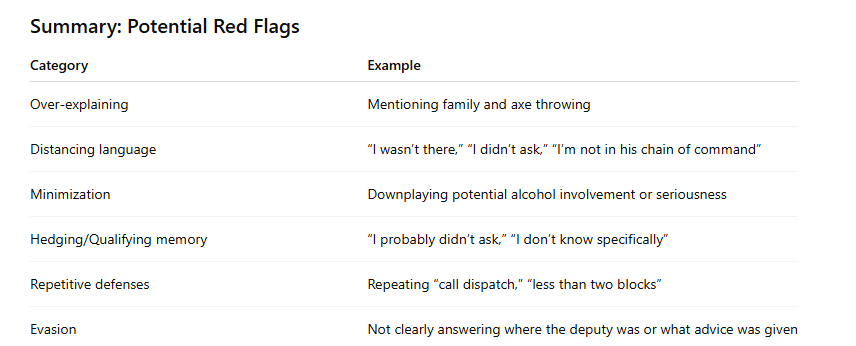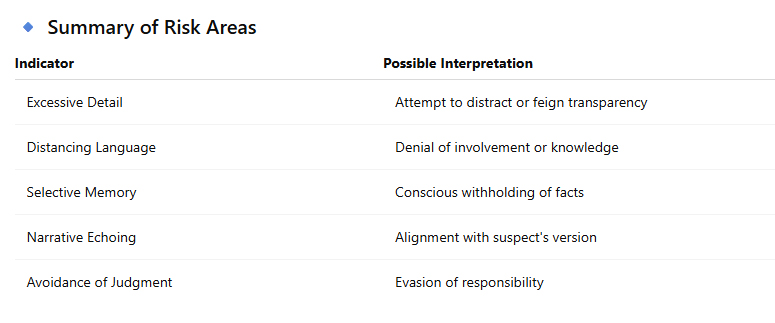Transcript Analysis From Sheriff Norris’ Shocking Interview With ISP Riddled With Red Flags
Is this a drunken off-duty KCSO deputy crash coverup?
The full length audio interview between ISP and Kootenai County Sheriff Bob Norris is riddled with red flags. In Norris’ bizarre testimony of a December 2021 vehicle collision involving an off duty KCSO deputy, Norris states that the deputy called him after he crashed his vehicle. The deputy allegedly left the scene of the accident. First, listen to the 12-minute interview provided by The Idaho Report, which is more of a “storytelling” opportunity for Bob Norris than it is a professional interview by an ISP Detective, then look at the red flags of deception which are lined out below. (view transcript). To view the Liberty Without Compromise Livestream Broadcast highlighting this transcript analysis, click here.
Interview Analysis Determines Norris’ Statements Are Full Of Red Flags Of Deception
Yes, this interview transcription contains several red flags of potential deception and efforts to distance or deflect responsibility. While none of these individually prove dishonesty, together they raise reasonable suspicion. Here are the key indicators:
1. Over-Explanation and Irrelevant Details
“…I had my two daughters…my son and my wife…we were in the car…”
- Why it’s a red flag: Providing unnecessary context or naming irrelevant people (like his family) can be a form of narrative padding, a technique often used to make a story feel more genuine or to emotionally influence the listener.
- It suggests possible preparation of a script or attempts to establish credibility or innocence by normalizing the situation.
2. Minimizing and Downplaying
“…we were going axe throwing…and it was kind of loud…”
“…I wasn’t there… I wasn’t drinking with him…”
“…I wasn’t in the best position to be able to tell you what to do…”
- These are all efforts to distance himself and minimize his potential involvement.
- Repetition of “I wasn’t there,” “I don’t know,” “I wasn’t with him” creates the appearance of proactively denying guilt before being accused.
3. Passive Language / Avoidance
“…I interpreted that he and I were drinking that day together or something…”
“…you’re going to be held accountable administratively…”
- Rather than being assertive or clear, he uses vague or passive phrasing, which can signal discomfort or awareness of wrongdoing.
- Saying “you’ll be held accountable administratively” avoids confronting the possible criminal implications.
4. Memory Qualifiers and Hedging
“…I don’t really know specifically…”
“…he may have…”
“…I probably didn’t even ask…”
“…I’m kind of summarizing…”
- Repeated vagueness or qualifying memory can indicate deliberate evasiveness.
- These phrases show an unusual level of uncertainty, especially for a law enforcement officer recalling a serious event.
5. Defensive Justifications
“…I’m not the best person to give you advice…”
“…you’re a deputy sheriff, you know the responsibilities…”
“…I had other things I had to do…”
- These are deflection tactics, suggesting he’s trying to shift the burden of responsibility back to the subject of the investigation.
- They also hint he may feel guilty for not acting or withholding something.
6. Repetition and Fixation on Certain Points
“…less than two blocks from home…”
“…call dispatch…”
“…I wasn’t there…”
- These repeated themes may indicate rehearsed points or things he wants to emphasize unnaturally, possibly to reinforce a specific narrative.
7. Verbal Leakage of a Possible Internal Conflict
“…did you hit a person and not realize you hit a person…”
- Bringing up a worst-case scenario without being prompted is known as “leakage”, which might reflect internal concern or awareness about something worse happening.
Suggesting that someone may have hit a person raises the stakes unnecessarily unless he has reason to believe that may have occurred.
Summary of Potential Red Flags

Behavioral analysis of the subject’s interview responses
This list of potential red flags in Bob Norris’ interview with ISP highlights even more in his interview responses:
1. Over-Explanation / Over-Justification
Description: The interviewee provides excessive and often irrelevant detail about personal context (e.g., family, axe-throwing, noisy environment).
Example: “We were going axe throwing… I don’t really know specifically, but I know that the first phone call was on the way there…”
Interpretation: May be a tactic to distract, create confusion, or appear overly transparent.
2. Distancing Language
Description: Use of phrasing that separates the speaker from the event or subject.
Examples: “I’m not there.” “I wasn’t drinking with you.” “I wasn’t with you.” “I’m not in his chain of command.”
Interpretation: Attempts to avoid association or accountability.
3. Minimizing or Vague Language
Description: Frequent use of qualifiers and ambiguous phrasing.
Examples: “I believe I could detect some slurred speech.” “He may have told me where he was.” “I kind of assumed…”
Interpretation: Avoids committing to details, suggests conscious withholding or uncertainty.
4. Memory Gaps Convenient to the Situation
Description: Strong memory for irrelevant details contrasted with unclear recall of critical facts.
Examples: Remembers activities from two months prior in detail but forgets if the subject disclosed their location or phone number. Interpretation: Selective memory that may indicate deception.
5. Defensive or Projective Statements
Description: The interviewee frequently defends themselves or deflects responsibility.
Examples: “I wasn’t drinking with him…” “I’m not the best person to tell you what to do…”
Interpretation: Indicates anticipation of being questioned or implicated.
6. Repetition of Suspect’s Language
Description: The speaker echoes specific phrases used by the subject of the call (e.g., “less than two blocks from home”).
Interpretation: Suggests narrative alignment or unconscious reinforcement of the subject’s version of events.
7. Avoidance of Clear Judgments
Description: The speaker refuses to provide firm opinions or conclusions, even when prompted.
Examples: “You’re going to have to make that evaluation for yourself.” “I’m not in the best position…”
Interpretation: Avoidance of responsibility, likely to evade scrutiny or consequences.
8. Suggesting an Acceptable Exit Strategy
Description: Offering advice that subtly implies avoiding law enforcement detection.
Example: Recommending the subject go home if the ETA is one hour. Interpretation: Tacit encouragement to evade potential legal trouble while maintaining deniability.

The opinions expressed by contributing authors or Op-Ed submissions to the Liberty Without Compromise Network do not necessarily reflect those of the founders of LWC, the hosts of the Liberty Without Compromise broadcast, or Dan Wilson for Kootenai County Sheriff. It is LWC's position to offer a forum for the marketplace of ideas, discussion, and at times, opposing viewpoints. With this in mind, the comment section contained in this website is open for all ideas and viewpoints provided the discussion remain productive and respectful of others.
SUBSCRIBE TO LIBERTY WITHOUT COMPROMISE
Receive Liberty Without Compromise e-mail updates and event notices.

s3re9m
Эффективное SEO для вашего бизнеса, стройная стратегия.
Как раскрутить сайт за короткое время, для начинающих.
GSA ser [url=https://kwork.ru/links/41629912/seo-pushka-dlya-sayta-mnogourovnevaya-piramida-ssylok-pod-klyuch/]GSA ser[/url] .
Праздничные кулинарные шедевры, обязательно приготовьте.
Идеи для здорового завтрака каждый день, сделают ваше утро ярче.
Топ 10 рецептов домашних десертов, с любовью и творчеством от поваров.
Изысканные рецепты национальных кухонь мира, сделают ваш стол незабываемым.
Семейные ужины, которые понравятся всем, составленные с учетом вкусовых предпочтений каждого.
Здоровые рецепты для активного образа жизни, сделают ваше тело сильнее и здоровее.
Летние угощения: вкусные блюда для пикника, составленные с учетом природных продуктов и свежих овощей.
Оригинальные рецепты напитков для вечерних посиделок, которые порадуют гостей и поднимут настроение.
Секреты кулинарного мастерства: лучшие советы поваров, приблизят вас к чему-то новому и неизведанному.
Вегетарианские рецепты для здорового питания, составленные из свежих фруктов и овощей.
Как сделать детский стол незабываемым, которые понравятся маленьким гурманам и изысканной публике.
Идеи для приготовления блюд в сезон овощей и фруктов, с учетом особенностей и потребностей вашего организма.
Рецепты быстрых закусок для встречи гостей, сделают вашу вечеринку незабываемой и стильной.
Как приготовить вкусный обед за полчаса, подадут легкость и вдохновение на целый день.
Домашние конфеты и сладости: лучшие рецепты, сделанные своими руками и душой.
Кулинарные инициации для начинающих: шаг за шагом
национальные рецепты [url=https://7eda.ru/#национальные-рецепты]https://7eda.ru/[/url] .
Выбор дизайнерской мебели премиум-класса.
Мебель премиум [url=https://byfurniture.by/]https://byfurniture.by/[/url] .